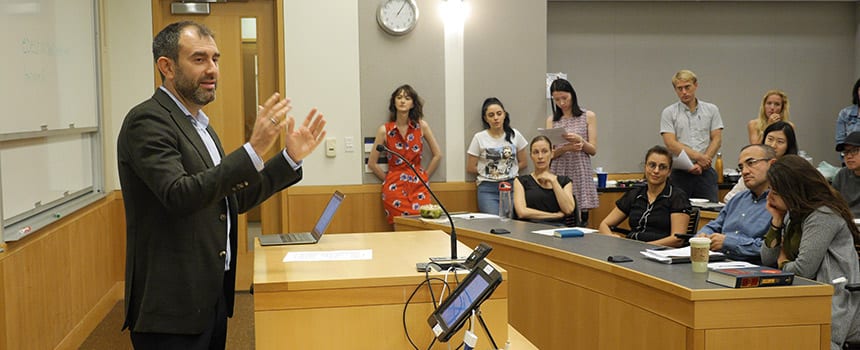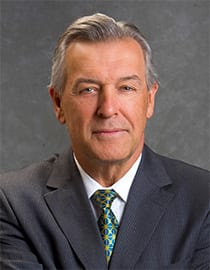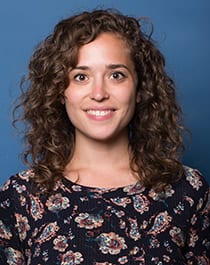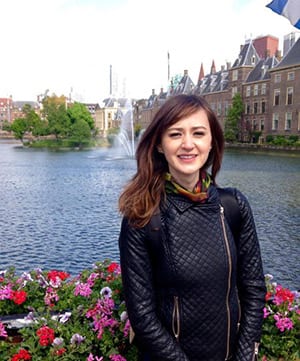
By Susan Gluss
A palpable sense of excitement infused a standing-room only classroom last week, as law students learned about a new field placement program, Berkeley Law in The Hague. For a school that already offers a slew of prestigious placements off campus, this was an unexpected bonus.
Organizers ran through a dizzying array of possible externships in The Hague: from international criminal tribunals to arbitration courts; from peace and security organizations to non-governmental organizations (NGOs), the military, and NATO. Applications are open now for Spring 2018.
Known as the “international city of peace and justice,” The Hague, Netherlands, plays an integral role in diplomacy and world affairs. Its courts hear notorious cases of war crimes, genocide, and crimes against humanity. But it’s also the center of public and private international disputes litigated at the Permanent Court of Arbitration, the European Patent Office, and other bodies.
One of the program’s advisors, Asa Solway ’09, told the rapt audience that there’s “nothing as exciting or fulfilling” as working at The Hague. And he should know. During law school, he spent two summers and a full semester there, assisting the U.S. State Department and the International Criminal Tribunal for the former Yugoslavia (ICTY).
“It’s really a unique opportunity, and I can’t emphasize that enough,” Solway said. “It’s something special. Everyone I know who has done it says the same thing. It’s an experience that lasts a lifetime.”
After graduation, Solway left for Sierra Leone to work in that nation’s Foreign Ministry, and he’s never looked back. In the past decade, he’s worked overseas on UN peacekeeping missions in northern Kosovo and monitored human rights in Ukraine. He’s now back in The Hague, starting a new job as a senior legal advisor with an international peace and security organization.

He credits The Hague for his remarkable international career.
“I never would have predicted any of those jobs,” Solway said, but “they all started because of my time in The Hague. … The people I met there and the opportunities I was given,” launched his professional path, he added.
An idea is born
Solway hatched the idea for Berkeley externships in The Hague with Emeritus Professor David Caron ’83, a seminal figure in international law. Caron taught at Berkeley Law for 25 years before becoming dean of law at King’s College London, where he still teaches. He’s now a member of the Iran-U.S. Claims Tribunal in The Hague.
Both Caron and Solway will be on the ground to advise and supervise student externs. The program could involve: a one or two credit course; research and writing memos; liaising with international institutions to cultivate professional networks; small discussion groups with guest professionals; and informal gatherings.
Law students may spend their third semester or beyond in the program and—if accepted—earn 10-12 units of credit. Rising second- and third-year students can intern in The Hague during their summer breaks.
Just a month into her first semester, Elizabeth Glusman ’20 is already thinking of applying for the program. Before law school, she worked as a paralegal for Foley Hoag in Washington, D.C., and ended up in The Hague assisting on a legal dispute between the Philippines and China. Glusman’s passion is international arbitration with a focus on maritime law.

“I had no idea that this would be an option when I applied here,” she said of The Hague program. “So, to me it’s just even more affirmation of my choice. This institution is clearly committed to expanding its resources” in international law.
A tremendous opportunity
Professor Laurel Fletcher, director of the school’s International Human Rights Law Clinic, is in The Hague this week with Mary Dahdouh ’18 to present a working paper on gender parity in international judicial bodies. Fletcher said a semester there would be an “invaluable complement” to a student’s clinical and course work at Berkeley.
“The opportunity to go to The Hague and work in one of the many tribunals or institutions gives students a chance to see and experience what international law-making looks like, and what its enforcement involves,” Fletcher said. “It’s a tremendous way to explore in-depth an area of international law and practice that might otherwise be hard to access,” she added.
Natalia Krapiva ’18 proved that point, calling her 1L internship at the ICTY an “incredible experience.” She assisted prosecutors in the ongoing war crimes trial against Ratko Mladić. The Serbian general is accused of playing a key role in the slaughter of more than 7,000 Bosnian Muslim men and boys in Srebrenica and other atrocities.

Krapiva “helped attorneys draft and review sections of the final trial brief that analyzed evidence related to crime scenes, military command structures, and intercepted communications,” she wrote in an email. The work also involved “identifying exhibits, witness statements and testimony; and reviewing, editing, and cite-checking drafts to ensure a comprehensive and accurate summary of the evidence.”
During her internship, Krapiva attended weekly lectures and participated in a mock courtroom trial, where she argued in front of prominent international criminal attorneys.
“The connections and friendships that I forged there are incredibly valuable for my future career in international criminal justice and human rights,” Krapiva wrote. “This experience made me confident that I want to dedicate my career to putting an end to impunity for the most powerful perpetrators of the most serious crimes against some of the world’s most vulnerable populations.”